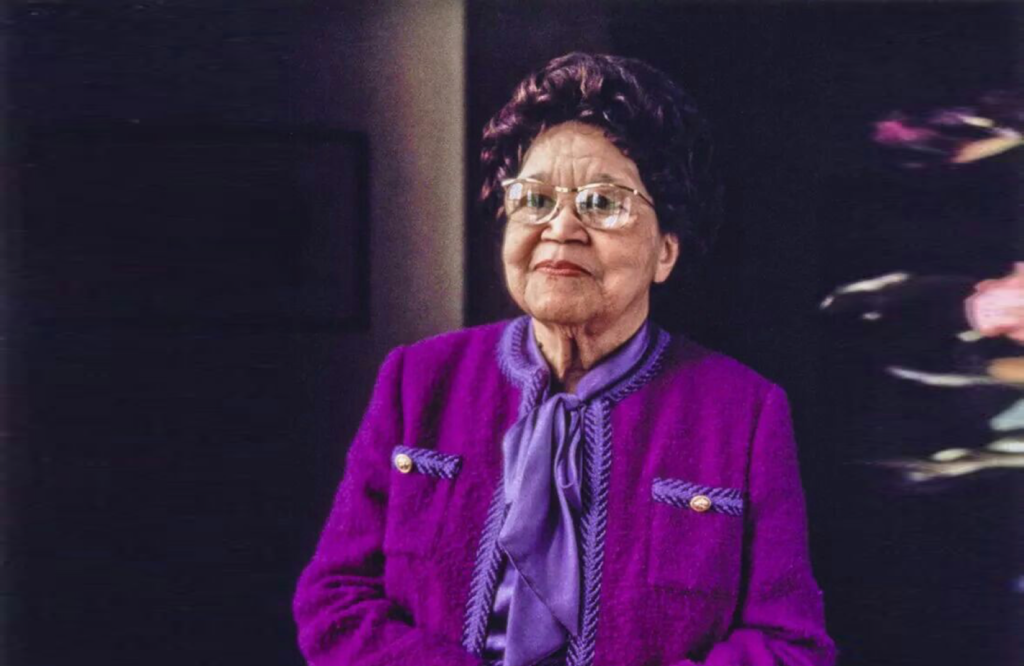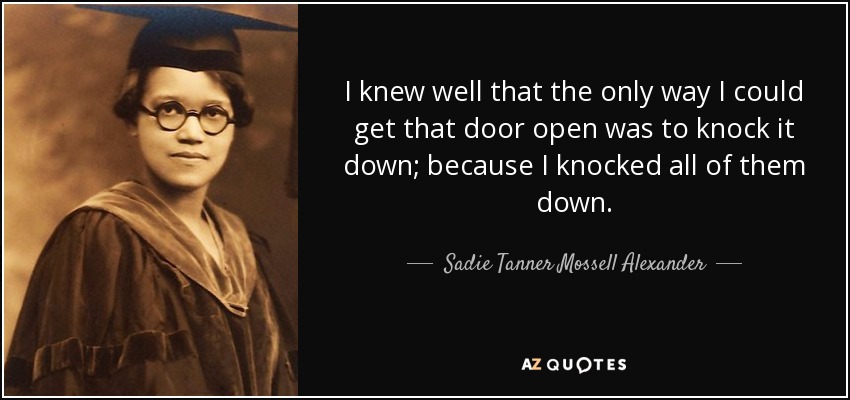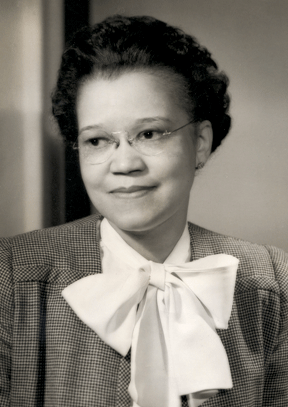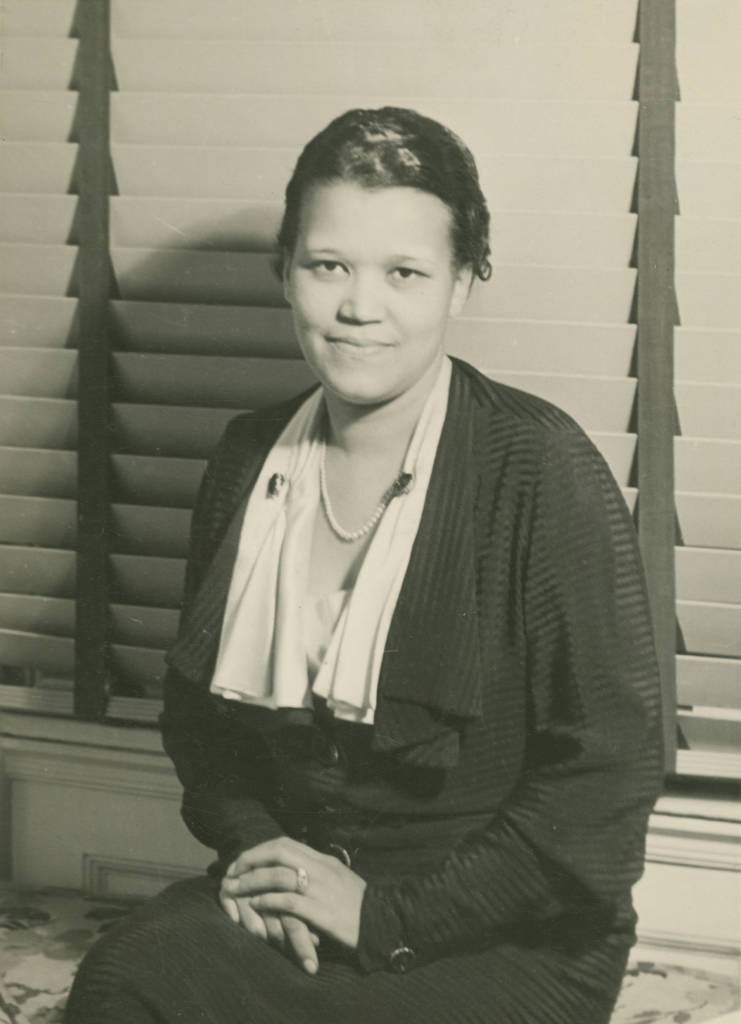
Born two decades before American women won the right to vote, Sadie Tanner Mossell Alexander didn't let anything stop her and overcame many obstacles as an African American Woman. She is credited with being “the first” in several different accomplishments in African American history.
She was the first African-American woman to receive a Ph.D. in economics in the United States (1921).
She was the first woman to receive a law degree from the University of Pennsylvania Law School.
She was the first African-American woman to practice law in Pennsylvania.
She became the first African American to hold both a Ph.D. and a J.D. degree.
she was the first woman to serve as secretary of the National Bar Association.
She was the first national president of Delta Sigma Theta Sorority (1919 to 1923).
In 1946 she was appointed to the President's Committee on Civil Rights established by Harry Truman. She was the first African-American woman appointed as Assistant City Solicitor for the City of Philadelphia.
One of the quotes Sadie is heard saying is that, "I knew well that the only way I could get that door open was to knock it down; because I knocked all of them down."

Growing up, Mossell Alexander attended high school in Washington, DC at the M Street School, now known as Dunbar High School, graduating in 1915. While attending University of Pennsylvania, she struggled with discrimination from students and professors.
In 1918 she graduated with honors with a B.S. degree in education but at the time was denied election into mainly-white-men led Phi Beta Kappa honor society.
Mossell returned to Philadelphia to study at the School of Education at the University of Pennsylvania, graduating in 1918. She pursued graduate work in economics, also at Penn, earning her master's in 1919. Unable to find work as an African American woman in Pennsylvania, she was hired by the black-owned North Carolina Mutual Life Insurance Company in 1921. Awarded the Francis Sergeant Pepper fellowship, she was able to continue her studies and in 1921 became the second African-American woman in the United States to earn a Ph.D.
Finding it difficult to get work in Philadelphia, Mossell worked for the black-owned North Carolina Mutual Life Insurance Company in Durham, North Carolina for two years.
In 1923, Mosell married Raymond Pace Alexander, returned with him to Philadelphia, and entered law school. She was the first African-American woman admitted to the University of Pennsylvania Law School. In 1927, she was its first African-American woman graduate, and the first to be admitted to the Pennsylvania Bar.
Mossell Alexander practiced law from 1927 until her retirement in 1982. Upon admission to the Bar, she joined her husband's law practice, specializing in estate and family law. They both were active in civil rights law as well. In 1928 she was the first African-American woman appointed as Assistant City Solicitor for the City of Philadelphia, serving to 1930. She was reappointed from 1934 to 1938. From 1943 to 1947 she was the first woman to serve as secretary of the National Bar Association. She was appointed to the Commission on Human Relations of the City of Philadelphia, serving from 1952 to 1968. In 1959, when her husband was appointed to the Court of Common Pleas in Philadelphia, she continued to practice law on her own. In 1976, she joined the firm of Atkinson, Myers, and Archie as a general counsel, where she stayed until her retirement.

If you look at her family, you can see why Mossell Alexander set the bar so high.
Her grandfather was Bishop Benjamin Tucker Tanner editor of the Christian Recorder and the AME Church Review. Her uncle was surgeon Dr. Nathan F. Mossell, founder of the Frederick Douglass Hospital (now Mercy-Douglass Hospital), and her aunt, Dr. Hallie Tanner Johnson, founded Tuskegee Institute’s Nurses’ School & Hospital. Her other uncle was the famous painter, Henry Ossawa Tanner.
Her father, Aaron Mossell, was the first African American to earn a law degree from the University of Pennsylvania and then became one of Philadelphia’s most prominent black attorneys and civil rights’ leaders.
Unfortunately, he struggled to provide for the family and deserted them a year after Sadie’s birth.
After graduating in 1927, she joined her husband’s law firm, becoming one of the earliest husband-wife legal teams in the United States.
As a Philadelphia lawyer, she advocated against racial discrimination, segregation, and employment inequality.
Between 1928 and 1938 she was Assistant City Solicitor for the City of Philadelphia and formed a legal aid bureau to assist African Americans who could not afford lawyers. Alexander's focus was frequently on racial and economic justice for the working class, especially for working men and women.
In 1947, President Harry S. Truman appointed Alexander to the President’s committee on the Civil Rights of All Races and Faiths, making her the first black woman to serve on a presidential commission.
In 1948, the National Urban League chose Alexander as its “Woman of the Year” and presented her story in a comic book for black children.
In 1970 Sadie Alexander finally was elected into Phi Beta Kappa.
In 1978, President Jimmy Carter appointed her chairperson, at the age of eighty-one, of the White House Conference on Aging. However, President Reagan removed her from the position in 1981, before the conference took place. Alexander continued to practice law in Philadelphia until she turned eighty-five.

Sadie died from complications of Alzheimer’s disease in Philadelphia in 1989 at the age of 91. Sadie Tanner Mossell Alexander, a true trailblazer! We salute you!









